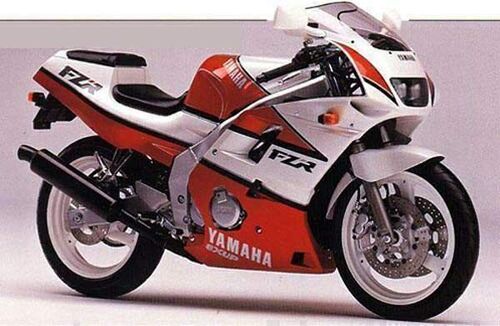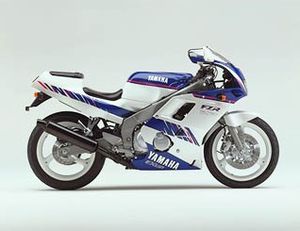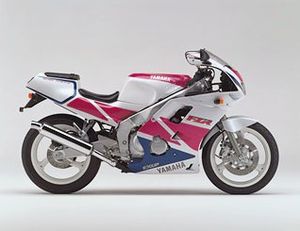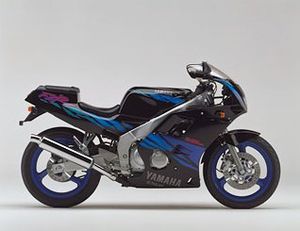Yamaha FZR 250
The Yamaha FZR 250 was first introduced in 1986 (model year 1987) and was intended for the Japanese domestic market.
The motorcycle was the youngest model in the FZR sports line, and at that time it was quite advanced - the high-powered 4-cylinder in-line Genesis engine produced 45 hp. power and accelerated the motorcycle to 180 km / h. Since 1988, the Yamaha FZR 250 has been equipped with the EXUP system - an electric valve in the exhaust pipe that changes the exhaust section depending on the engine speed. Since 1989, the motorcycle has received a major update - an aluminum Deltabox frame, an aluminum swingarm, a new front fork, new front brakes, reconfigured suspensions, a fuel tank for 14 and, most importantly, changes in the engine - the engine has become easier to spin, giving out maximum power of 16,000 rpm, the tachometer is marked up to 21,000 rpm.
In 1993, due to a change in Japanese legislation, the engine was "throttled" to 40 hp, and in 1994 the model was finally discontinued. The subsequent refusal of the entire Japanese "devil" from low-volume, high-powered 4-cylinder models was associated, first of all, with their low resource, which could be several times inferior even to 400-cc motorcycles. In addition, the production of such motorcycles was quite expensive, since parts and technical solutions used on older versions (Deltabox, EXUP, etc.) were often used.
Yamaha FZR Series Lineup:
- Yamaha FZR250
- Yamaha FZR400
- Yamaha FZR600
- Yamaha FZR750
- Yamaha FZR1000
The main competitors of the Yamaha FZR250 in the class:
Photos
Specifications
Specifications Yamaha FZR 250:
| Model | Yamaha FZR250 (FZR250R) |
|---|---|
| Motorcycle type | sport |
| Release year | 1986-1994 |
| Frame | steel tubular - FZR250 (1986-1988)
aluminum Deltabox |
| Engine type | 4-cylinder, 4-stroke, in-line |
| Working volume | 249 cc cm. |
| Bore / stroke | 48.0mm x 34.5mm |
| Compression ratio | 12.0: 1 |
| Cooling | liquid |
| Number of valves per cylinder | DOHC, 4 valves per cylinder |
| Fuel supply system | carburetor, 4x MIKUNI BDS26 |
| Ignition type | CDI |
| Maximum power | 45 hp (33.1 kW) @ 14,500 rpm - FZR250 (1986-1988)
45 h.p. (33.1 kW) @ 16,000 rpm - FZR250 (1989-1992) 40 h.p. - FZR250 (1993-1994) |
| Maximum torque | 24.5 Nm (2.5 kgm) @ 11,500 rpm - FZR250 (1986-1988)
24.5 Nm (2.5 kgm) @ 12000 rpm - FZR250 (1989-1994) |
| Gearbox | 6-speed |
| Drive type | chain |
| Front tire size | 100 / 80-17 |
| Rear tire size | 120 / 80-17 - FZR250 (1986-1988)
130 / 70-17 - FZR250 (1989-1994) |
| Front brakes | 1 disc, 320mm, 4-piston caliper - FZR250 (1986-1988)
2 discs, 282mm, 4-piston calipers - FZR250 (1989-1994) |
| Rear brakes | 1 disc 220 mm, 1-piston caliper |
| Front suspension | 35mm telescopic fork, 110mm travel - FZR250 (1986-1987)
35mm telescopic fork, 120mm travel - FZR250 (1988) 38mm telescopic fork, 117mm travel - FZR250 (1989-1994) |
| Rear suspension | linkage with monoshock, stroke - 140 mm - FZR250 (1986-1988)
linkage with monoshock, stroke - 130 mm - FZR250 (1989-1994) |
| Length | 2010mm - FZR250 (1986-1988)
1990 mm - FZR250 (1989-1994) |
| Width | 680 mm - FZR250 (1986-1988)
675 mm - FZR250 (1989-1994) |
| Height | 1120 mm |
| Wheelbase | 1375 mm |
| Saddle height | 750mm - FZR250 (1986-1988)
735 mm - FZR250 (1989-1994) |
| Acceleration to 100 km / h | 5 sec |
| Maximum speed | 180 km / h |
| Fuel tank capacity | 12 L - FZR250 (1986-1988)
14 L - FZR250 (1989-1994) |
| Motorcycle weight (dry) | 140 kg - FZR250 (1986-1988)
141 kg - FZR250 (1989-1994) |
Documentation



